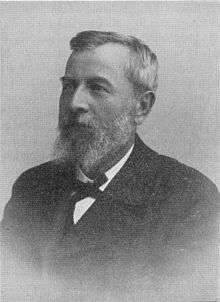Louis Auguste Sabatier

Louis Auguste Sabatier (French: [sabatje]; 22 October 1839 – 12 April 1901),[1] French Protestant theologian, was born at Vallon-Pont-d'Arc, Ardèche, in the Cévennes.
He was educated at the Protestant theological faculty of Montauban as well as at the universities of Tübingen and Heidelberg.[1]
After holding the pastorate at Aubenas in Ardèche from 1864 to 1868, he was appointed professor of reformed dogmatics at the theological faculty of Strasbourg.[1] His markedly French sympathies during the War of 1870 led to his expulsion from Strassburg in 1872.[1] After five years' effort he succeeded in establishing a Protestant Faculty of Theology in Paris (today: Faculté de théologie protestante de Paris) along with Eugène Ménégoz, and became professor and then dean.[1] In 1886, he became a teacher in the newly founded religious science department of the École des Hautes Etudes at the Sorbonne.[1]
Published works
Among Louis Auguste Sabatier's chief works were:
- Mémoire sur la notion hébraique de l'Esprit (1879).
- Les origines littéraires et la composition de l'apocalypse de Saint Jean (1888).
- The Vitality of Christian Dogmas and their Power of Evolution (1898).
- Outlines of a philosophy of religion based on psychology and history (1902).
- The Apostle Paul (1903).
- The doctrine of the atonement and its historical evolution; and, Religion and modern culture (1904).
- Religions of Authority and the Religion of the Spirit; translation of Les religions d'autorité de la religion dell'esprit (1904, posthumous), to which his colleague Jean Réville prefixed a short memoir.
These works show Sabatier as "at once an accomplished dialectician and a mystic in the best sense of the word".[1]
References
- 1 2 3 4 5 6 7 8

- On his theology
- Eugène Ménégoz in Expository Times, xv.30
- G. B. Stevens in Hibbert Journal (April 1903)
